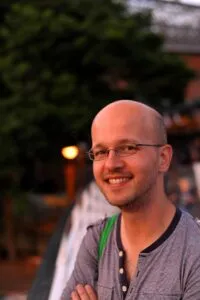I studied abroad with AFS in Stillwater, Minnesota, USA, in 1994-1995. I still consider it to be the best year of my life – everything was so intense and I felt so alive, I learned so much, felt so much loved and loved so much. I have had plenty of other wonderful opportunities and moments in my life so far, but 1994-1995 is still a milestone in my mind.
I grew up in Porto, Portugal, studied law in Coimbra, Portugal, and Bologna, Italy, worked for a while in Lisbon, Portugal, and then did a PhD in law in Bremen, Germany. Then I ended up in the UK, where I have worked as a lecturer at the University of Manchester and senior lecturer at the University of Liverpool. In 2016, I moved to the University of Sussex, where I am a professor of law, teach European Union Law & Policy, LGBTQI+ Rights, and Migration Law & Governance, and do research mostly on human rights and migration. Along the way I have also been a trainer for EFIL, entered into a same-sex civil partnership and adopted two children – definitely the most challenging and rewarding thing in my whole life!

Not much of what I have done in my life – professionally or privately – would have happened if I had not been an exchange student in my teen years
That year as an AFSer opened my eyes to many new things and gave me a strong sense that more was possible. It allowed me to discover myself immune to the usual peer and social pressures, re-define who I wanted to be, and experiment more academically and personally. I deeply believe that I owe that year in Minnesota – and my wonderful parents for having supported my wish to take part in this exchange programme and my incredibly lovely host family during that time – all that I have done ever since, because it taught me to aim higher, not settle for the obvious and within easy reach, and not allow peer pressure and social expectations to quash my dreams and aspirations. Crucially, it taught me to be true to myself and to others, and to do my bit for a better world in whatever ways I can.
My life at work nowadays is mostly dedicated to researching the experiences of refugees and how to better support their journeys to safety and building a new life. I’ve been doing this mainly in the context of two projects: SOGICA and TRAFIG. SOGICA – Sexual Orientation and Gender Identity Claims of Asylum: A European human rights challenge – was a research project funded by the European Research Council (ERC) exploring the social and legal experiences of individuals across Europe claiming international protection on the basis of their sexual orientation or gender identity (SOGI). The project sought to determine how European asylum systems can treat more fairly asylum claims based on the claimant’s SOGI and provide the necessary evidence base to improve current law, policy and decision-making. And the project TRAFIG – Transnational Figurations of Displacement – is another project funded by the European Union. TRAFIG has analysed the governance system of forced displacement and identifies protection solutions through the use of human relationships and movements. Through comparative empirical research in refugee camps and cities in Asia, Africa and Europe, and the input from experts from around the world, the project has, among other things, traced refugees’ networks of interaction and support beyond their place of living and analysed how these transnational connections shape their current situation and their future mobility trajectories. One of the key aims has been to develop a rapid assessment tool in order to support policymakers and practitioners to enhance the self-reliance of displaced people.
My motivation to do research in this field is to contribute – even if just in a little way – to the lives of people who have been deprived of their rights and livelihood, and deserve the utmost respect and support from the international community. Being based in the UK – and considering the turmoil through which the country has gone because of Brexit – it is more important than ever to fight for humanity and solidarity to prevail over borders and nationalisms. It is a hard fight – and we cannot afford to lose it.

